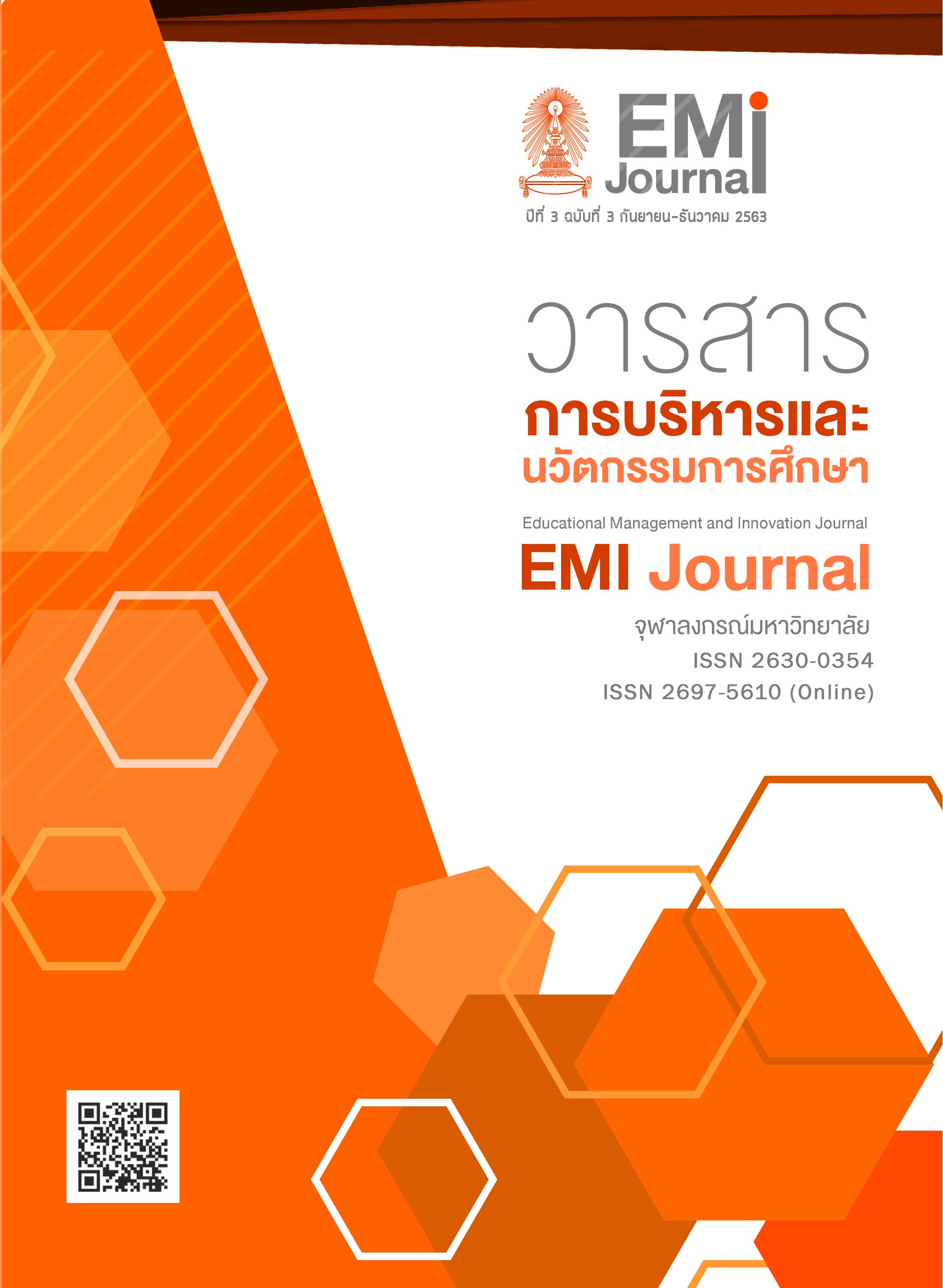กลยุทธ์การบริหารสถานศึกษาด้วยความรับผิดชอบต่อสังคมของสถานศึกษาสังกัดเทศบาล
กลยุทธ์การบริหารสถานศึกษาด้วยความรับผิดชอบต่อสังคมของสถานศึกษาสังกัดเทศบาล
คำสำคัญ:
กลยุทธ์ การบริหารสถานศึกษา ความรับผิดชอบต่อสังคมบทคัดย่อ
การวิจัยนี้มีวัตถุประสงค์เพื่อ 1) ศึกษาองค์ประกอบความรับผิดชอบต่อสังคมของสถาน ศึกษาสังกัดเทศบาล 2) ศึกษาสภาพปัจจุบันและสภาพที่พึงประสงค์ของการบริหารสถานศึกษาด้วยความรับผิดชอบต่อสังคมของสถานศึกษาสังกัดเทศบาล 3) พัฒนากลยุทธ์การบริหารสถานศึกษาด้วยความรับผิดชอบต่อสังคมของสถานศึกษาสังกัดเทศบาล และ 4) ประเมินกลยุทธ์การบริหารสถานศึกษาด้วยความรับผิดชอบต่อสังคมของสถานศึกษาสังกัดเทศบาล วิธีดำเนินการวิจัยมี 4 ขั้นตอน ดังนี้ การวิเคราะห์เอกสารและการวิเคราะห์องค์ประกอบเชิงยืนยัน การศึกษาสภาพปัจจุบันและปัญหาและการวิเคราะห์ดัชนีความต้องการจำเป็น การพัฒนากลยุทธ์ และการประเมินกลยุทธ์ กลุ่มตัวอย่าง ได้แก่ ผู้บริหารสถานศึกษา จำนวน 340 คน ผู้ทรงคุณวุฒิ จำนวน 15 คน และผู้บริหารสถานศึกษา จำนวน 289 คน เครื่องมือ ได้แก่ แบบสอบถามและแบบสัมภาษณ์ วิเคราะห์ข้อมูลโดยวิเคราะห์เนื้อหา ค่า Chi-square, Df, P-value, GFI, AGFI RMSEA, PNImodified, ความถี่, ร้อยละ, , SD
ผลการวิจัยพบว่า 1) องค์ประกอบความรับผิดชอบต่อสังคมของสถานศึกษาสังกัดเทศบาล ประกอบด้วย 5 องค์ประกอบหลัก 12 องค์ประกอบย่อย และผลการวิเคราะห์องค์ประกอบเชิงยืนยันโมเดลมีความสอดคล้องกับข้อมูลเชิงประจักษ์อย่างมีนัยสำคัญทางสถิติที่ 0.01 2) การศึกษาสภาพปัจจุบัน ภาพรวมอยู่ในระดับมากทุกด้าน และสภาพที่พึงประสงค์ อยู่ในระดับมากที่สุดทุกด้าน และความต้องการจำเป็นการบริหารสถานศึกษาด้วยความรับผิดชอบต่อสังคม มีค่าดัชนีความต้องการจำเป็น เรียงลำดับจากค่าสูงสุดไปค่าต่ำสุดดังนี้ ด้านมนุษยธรรม สิ่งแวดล้อม เศรษฐกิจ ธรรมาภิบาล และกฎหมาย 3) การพัฒนากลยุทธ์การบริหารสถานศึกษาด้วยความรับผิดชอบต่อสังคมของสถานศึกษาสังกัดเทศบาล มี 5 กลยุทธ์หลัก คือ กลยุทธ์พัฒนาการบริหารทรัพยากรทางการศึกษาให้เกิดประสิทธิภาพ กลยุทธ์การยึดหลักนิติธรรมและปทัสถานทางสังคม กลยุทธ์การสร้างจิตอาสาและบริการสาธารณะ กลยุทธ์สร้างจิตสำนึกที่ดีต่อทรัพยากรธรรมชาติและสิ่งแวดล้อม และกลยุทธ์การสร้างความโปร่งใส ความเป็นธรรมและการมีส่วนร่วม 4) ตรวจสอบกลยุทธ์การบริหารสถานศึกษาด้วยความรับผิดชอบต่อสังคมของสถานศึกษาสังกัดเทศบาล ผลการตรวจสอบเชิงคุณภาพพบว่า กลยุทธ์การบริหารสถานศึกษาด้วยความรับผิดชอบต่อสังคม มีความถูกต้อง เหมาะสม เป็นไปได้ และเป็นประโยชน์ อยู่ในระดับมากที่สุดทุกด้าน และการตรวจสอบเชิงปริมาณพบว่า กลยุทธ์การบริหารสถานศึกษาด้วยความรับผิดชอบต่อสังคม มีความถูกต้อง และเป็นไปได้ อยู่ในระดับมากที่สุด และมีความเหมาะสม และเป็นประโยชน์ อยู่ในระดับมาก
Downloads
เอกสารอ้างอิง
Arjinsamajarn, C. (2007). Leadership in organization. Bangkok: Panyachon. [in Thai]
Asawaphum, S. (1998). Teaching documents of major subjects and educational administration theory. Ubon Ratchathani: Ubon Ratchathani Ratjabhat Instutute. [in Thai]
Bartol, K. M., & Martin, D. C. (1998). Management (2nd ed.). New York: McGraw-Hill.
Bateman, S. T., & Snell, S. A. (2007). Management: leading & collaborating in a competitive world (7th ed.). Boston: Irwin McGraw-Hill.
Boonmongkorn, J. (2007). Business ethics. Bangkok: Chulalongkorn University. [in Thai]
Bovee, Courtland L., Thill, John V., Wood, Marian B., & Dovel, George P. (1993). Management. New York: McGrow-Hill.
Cambell, Ronald F., john E. Corbally, Jr., & John A. Ransayer. (1968) Introduction to Educational Administration (3rd ed.). Boston: Allyn and Bacon, p. 69.
Carroll, A. B. (1991). The Pyramid of Corporate Social Responsibility: Toward The Moral Management of Organization Stakeholders. Business Horizons, 34(4), 39-48.
Caulter, M. (2005). Strategic Management in Action. New Jersey: Pearson Education, Inc.
Chareonwongsak, K. (2015). CSR in Thailand is still far from sustainability. Retrieved January 15, 2017, from http://www.kriengsak.com/issues/csr-3 [in Thai]
David, Fred R. (2007). Strategic Management (11th ed.). New Jersey: Prentice Hall, Inc.
Drucker, Peter F. (1979). Management: Task, Responsibility, Practices. London: Pan Book.
Eisner, E. (1976). Educational connoisseurship and criticism: Their form and function in educational evaluation. Journal of Aesthetic Education, 39(2), 192-193.
Glickman, Carl. D., Stephen P. Gordon & Jovita M. RossGordon. (2010). Super Vission and Instructional leadership (8th ed.). Boston, USA: Pearson Education Inc.
Gulick, L., & L. Urwick. (Eds.). (1939). Paper on the Science of Administration. New York: Institute of public Administration, Columbia University.
International Organization for Standardization. (2010). ISO26000: Guidance on social Responsibility International Standard. Geneva. International Organization for Standardization.
Institute Social Business. (2013). Corporate Social Responsibility for Sustainability of
Organization. The Stock Exchange of Thailand. [in Thai]
Kanchanawasri, S. (2011). Theory of assessment (8th ed.). Bangkok: Chulalongkorn University Press. [in Thai]
Keeves, P. J. (1988). Educational research, methodology and measurement: An international handbook. Oxford: Pergamon Press.
Kotler, P., & Lee N. (2005). Corporate Social Responsibility. Doing the Most for your Company and your cause. Hoboken, New Jersey. Canada: John Wiley & Sons, Inc.
Kotler, P., & Lee, N. (2005). Corporate Social Responsibility. New Jersey: John Willey & Sons.
Kruengkrai, Y. (2017). The development of educational institution management model with social responsibility of schools under the local government organization. Journal of Peace Studies, MCU, year 6 Issue 4. (October-December 2018), 1784-1795. [in Thai]
Leekul, P. (2015). Development of Social Responsibility Indicators of Secondary Schools In Eastern Region Under Office of Basic Education Commission. (Doctoral dissertation, Burapa University). [in Thai]
MacMillan, J. H., & Schumacher, S. (2001). Research in Education. A Conceptual Introduction (5th ed.). Boston: Longman.
Mattkarutjit, M. (2010). Local education management: by community For the Thai community and society. Bangkok: Bookpoint. [in Thai]
Post, J. E., Lawrence, A. T., & Water, J. (2005). Business and Society: Corporate Strategy, Public Policy, Ethics. Boston: McGraw-Hill/Lrwin.
Powpa, N. (2011). Study of State and Problems of Personnel Administration In Schools Under Municipalities. Phra Pradaeng, Samut Prakan Province Journal of Electronics Education. OJED, 7(1), 1924-1938. [in Thai]
Rattanamook, S. (2011). School Management with Social Responsibility Managing SR School. Bangkok: Office of the Graduate Studies of Volunteers Thammasat University. [in Thai]
Robbins, Stephen P. (1990). Organization Theory: Structures, Designs, and Applications (3rd ed.). Englewood Cliffs, NJ: Prentice Hall.
Runcharoen, T. (2014). Professionalism in Educational Management. Bangkok: Kawfang. [in Thai]
Saenmanoch, O. (2014). Social Responsibility of school administrators under Pathum Thani Educational Service Area Office, Area 2. (Master’s thesis, Valaya Alongkorn Rajabhat University in royal patronage). [in Thai]
Schermerhorn, J. R. (2008). Management (9th ed.). NJ: John Wiley & Sons, Inc.
Secretariat of Council Education. (2008). Report on Organization Local Administrative Organization Education Year 2008. Bangkok: Ploen Studio Company Limited. [in Thai]
Sergiovanni, Thomas J., et al. (1992). Educational Governance and Administration (3rd ed.). Boston: Allyn and Bacon.
Sornsuwan, R. (2014). Journal of Veridian E-Journal, Year 7, No. 2 Humanities Social Sciences and Arts (May-August 2014), 813-825. [in Thai]
Thongborisut, P. (2016). The Development of Social Responsibility Indicator of Schools Under Office of Primary Education Service Area. (Doctoral dissertation, Valaya Alongkorn Rajabhat University in royal patronage). [in Thai]
Thongkhachok, T. (2013). Corporate social responsibility of Listed Companies in the Stock Exchange of Thailand. (Doctoral dissertation, Prince of Songkha University). [in Thai]
United Nations. (2012). From Rio to Rio + 20: Progress and challenges since the 1992 Earth Summit. In Rio de Janero: United Nations Conference on Sustainable Development (Fact Sheet). Brazil: UNCSD 2012.org.
United Nations Development Program (UNDP). (2015). GOVGERNANCE. [Online]. Retrieved March 28, 2015, from http://mirror.undp.org
Wheelen, T. L., & Hunger, J. D. (2010). Strategic Management and Business Polycy: Achieving Sustainability (12th ed.). Boston: Pearson.



